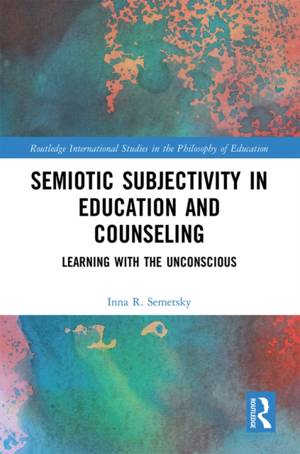
- Afhalen na 1 uur in een winkel met voorraad
- Gratis thuislevering in België
- Ruim aanbod met 7 miljoen producten
- Afhalen na 1 uur in een winkel met voorraad
- Gratis thuislevering in België
- Ruim aanbod met 7 miljoen producten
Omschrijving
Semiotic Subjectivity in Education and Counseling demonstrates the importance of addressing the concept of the unconscious in learning. Exploring the innovative concept of edusemiotics, it challenges the received notion of learning as solely academic and linguistic, instead offering an ethico-aesthetic paradigm that draws on transdisciplinary research in the context of this new direction in educational theory.
The chapters explore the production of subjectivity within the process of semiosis as the action and transformation of signs. An unorthodox pedagogy of the unconscious blends with the therapeutic dimension and produces subjectivities that emerge in the midst of the relational dynamics of experience. The book argues for holistic education that rejects the schism between matter and spirit pervading Western thinking and represents a shift in rethinking spirituality while never separating it from logic and reason. Giving voice to the unconscious contributes to learning and changing our habits as an important objective in educative and counseling practices.
The book critically examines the legacy of Charles S. Peirce, Lev S. Vygotsky and other forerunners of edusemiotics. It will be essential reading for academics, researchers and postgraduate students across the fields of educational philosophy, educational psychology and counseling as well as science studies.
Specificaties
Betrokkenen
- Auteur(s):
- Uitgeverij:
Inhoud
- Aantal bladzijden:
- 184
- Taal:
- Engels
- Reeks:
Eigenschappen
- Productcode (EAN):
- 9781032087733
- Verschijningsdatum:
- 30/06/2021
- Uitvoering:
- Paperback
- Formaat:
- Trade paperback (VS)
- Afmetingen:
- 156 mm x 234 mm
- Gewicht:
- 267 g

Alleen bij Standaard Boekhandel
Beoordelingen
We publiceren alleen reviews die voldoen aan de voorwaarden voor reviews. Bekijk onze voorwaarden voor reviews.












